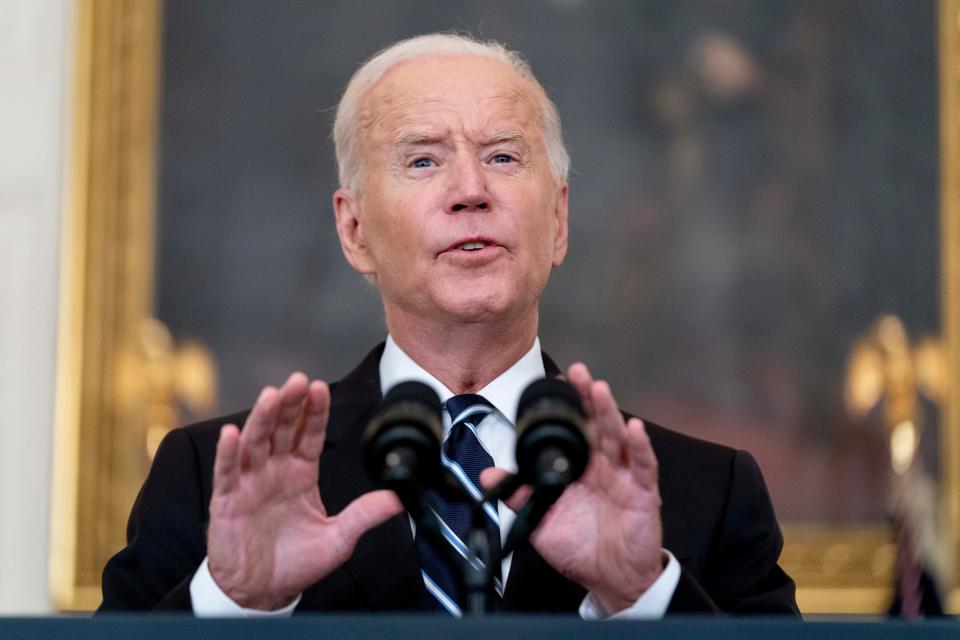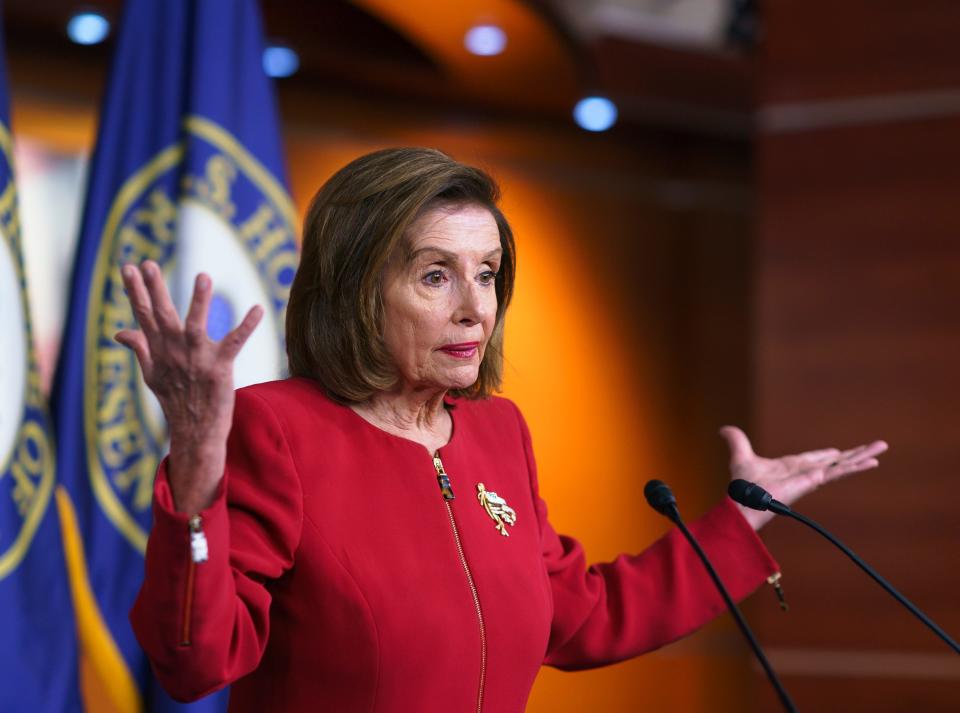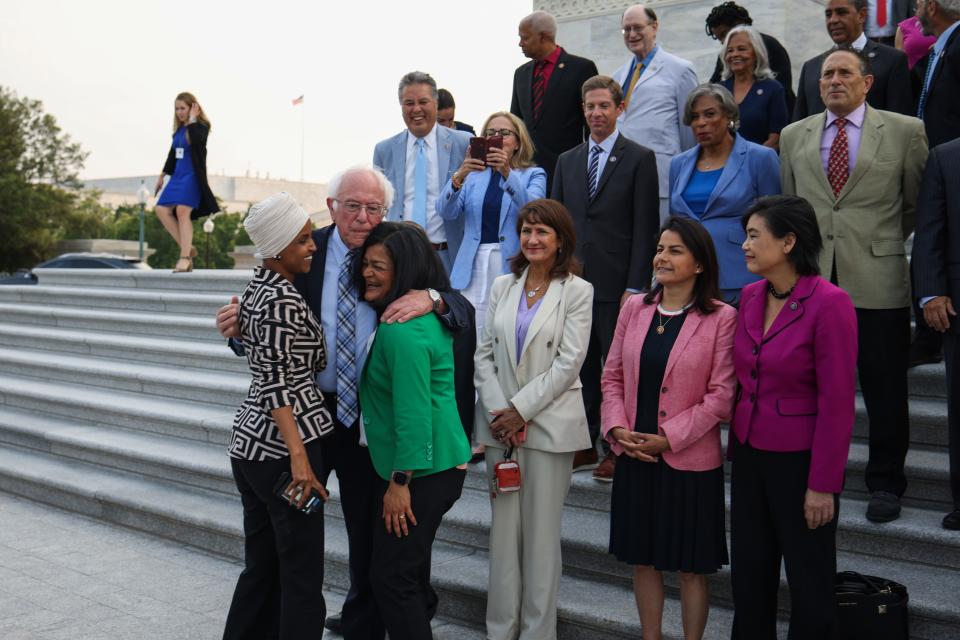Business groups are fighting Biden's $3.5T budget over Medicare, tax and climate plans
- Oops!Something went wrong.Please try again later.
- Oops!Something went wrong.Please try again later.
- Oops!Something went wrong.Please try again later.
WASHINGTON – As some crucial Democrats express concerns over President Joe Biden’s $3.5 trillion budget that is the centerpiece of his domestic agenda, major business groups are fighting various parts of the wide-ranging bill.
Advocacy groups are drawing battle lines in opposition to parts of the bill aiming to raise taxes on corporations and wealthy individuals, lower prices on prescription drugs and combat climate change. The fights that could trim or threaten to kill the legislation will play out in the coming days and weeks as committees rush to meet a Wednesday deadline for drafting legislation.
Groups such as the U.S. Chamber of Commerce, the National Association of Manufacturers and the Business Roundtable contend raising corporate taxes to pay for the massive package will hurt the economy by discouraging investment and spurring inflation.

Specific industries have also raised concerns about their corners of the proposal. Pharmaceutical manufacturers oppose a House strategy to allow Medicare to negotiate drug prices. Energy groups oppose a potential tax on methane emissions, a greenhouse gas that traps more heat than carbon dioxide.
The opposition contrasts sharply with widespread support for a $1.2 trillion infrastructure package for roads and bridges. The Senate approved that package on a bipartisan, 69-30 vote. It now awaits a House vote.
Democratic leaders in both chambers of Congress are trying to approve the $3.5 trillion worth of Biden's domestic priorities, in what they call a once-in-a-generation effort. Among other aims, Biden wants the bill to include free prekindergarten and community college and dedicate billions for caregiving and child care.
Sen. Joe Manchin: Manchin in op-ed says Democrats should 'pause' on their $3.5 trillion budget plan, citing concerns over inflation

The Democrats' strategy avoids a Senate filibuster and wouldn't need Republican votes.
"We will have a great bill that will honor the values of the president and his vision," House Speaker Nancy Pelosi, D-Calif., told reporters last week.
But unified Republican opposition in the narrowly divided House and Senate means just a few Democratic defectors could scuttle what is potentially the biggest budget bill ever debated. Industry groups are wielding big-ticket advertising and grassroots lobbying to persuade lawmakers to oppose the legislation.
“We’ll be using any tool available to us," Aric Newhouse, senior vice president for policy and government relations at the National Association of Manufacturers, told USA TODAY.
Trade groups are fighting the reversal of Trump's tax cuts
The key to funding Biden’s priorities – and to the opposition they have generated – is his proposal to essentially overturn the Trump administration tax cuts on corporations and on individuals earning more than $400,000 per year.
Biden and dozens of progressive advocacy groups are pursuing the tax hikes in order to pay for priorities such as federally subsidized prekindergarten and community college, paid family leave and expanding Medicare with vision, dental and hearing benefits.
“Somebody has got to pay. And when those who can afford to pay aren’t paying anywhere near their fair share, it means you all pay more,” Biden said Sept. 3. “For those big corporations that don’t want things to change, my message is this: it’s time for working families – the folks who built this country – to have their taxes cut.”
Lawmakers are still working out the details on the corporate tax rate, which dropped from 35% to 21% under the 2017 law, and on individuals. Biden proposed a 28% corporate rate and said higher taxes on the wealthy are a matter of fairness. The House Ways and Means Committee released draft legislation Monday calling for a 26.5% top corporate tax rate.
After the Senate and House approved the budget framework in August, corporate opposition was intense and immediate.
Suzanne Clark, CEO of the U.S. Chamber of Commerce, said the package would “dramatically expand the size and scope of government through record levels of inflationary spending and impose massive tax increases that will halt America’s fragile economic recovery.”
“The Chamber will do everything we can to prevent this tax-raising, job-killing reconciliation bill from becoming law,” she said.
The National Association of Manufacturers released a study that calculated 1 million jobs would be lost in the first two years under a tax hike to a 25% corporate rate. The economy would decline by $169 billion in 2026, according to the study by Rice University economists John Diamond and George Zodrow. And companies would invest $70 billion less in 2026, the study found.
The association also released a survey Thursday that found 94% of manufacturers said higher taxes would hurt their businesses. The group also launched a six-figure advertising campaign, with print, radio and digital ads in Washington and key states, calling on Congress to oppose tax increases.
"This survey delivers an urgent warning for lawmakers: if you raise taxes on manufacturers, there will be no avoiding widespread job losses, slower growth and wage stagnation," Jay Timmons, CEO of the National Association of Manufacturers, said in a statement.
Sen. Bernie Sanders, I-Vt., head of the Budget Committee who aimed for a $6 trillion package rather than $3.5 trillion, said corporations and wealthy individuals avoid paying taxes while the burden falls increasingly on the working class.
“Yes, we are going to raise taxes on large, profitable corporations – many that in a given year don’t pay a nickel in federal income tax,” Sanders said in a tweet on Sept. 7.
“At a time of massive wealth and income inequality, we can no longer tolerate a rigged tax system that allows the top 1% to avoid $163 billion in taxes that they owe,” Sanders said in a tweet on Sept. 8. “Yes, we will demand that the 1% pays its fair share and we will use that revenue to invest in working families.”
Midterm elections: Texas abortion law could hurt Republicans in 2022 midterm elections, experts say

Drugmakers oppose Medicare price negotiation
Besides the broad tax implications, industries and lawmakers voiced concerns about specific provisions in the legislation, particularly the cost of prescriptions.
One contentious element that Congress has debated – and killed – for decades aims to allow Medicare to negotiate the price of prescription drugs. The goal is to reduce costs for the elderly and people with disabilities who participate in the Medicare prescription program that Congress created in 2003.
“We’re going to bring down the cost of prescription drugs by allowing Medicare to finally be able to negotiate drug prices with producers,” Biden said on Sept. 3.
AARP sponsored a seven-figure television and digital ad campaign endorsing Medicare negotiations in states such as Arizona, Delaware, New Jersey and Pennsylvania. AARP was also publicizing the debate through social media, tele-town halls with elected officials and in its publications.
The proposal is that Medicare could negotiate lower prices because 45 million people participate in its drug program. But the industry through Pharmaceutical Research and Manufacturers of America says private insurers that administer the program already negotiate prices. Steeper savings would require the threat of refusing to pay for medications, which is unpopular with patients seeking cutting-edge drugs such as those for cancer, according to manufacturers.
Lawmakers haven't detailed yet how they would authorize Medicare negotiations. But Pelosi said the strategy could mirror one the House approved in 2019. Under that proposal, Medicare would effectively cap the amount it paid for drugs at 120% of the average price in Australia, Canada, France, Germany, Japan and the United Kingdom.
This would reduce the price of more expensive drugs in America and reduce federal spending by an estimated $456 billion over a decade, according to the nonpartisan Congressional Budget Office.
Immigration in the budget bill: Could sweeping changes be coming to immigration laws? Advocates hope budget bill is the answer
Pelosi told reporters last week this strategy would be included in the budget. “We are all for that,” she said.
A sticking point has been how to enforce negotiations if a drugmaker chose not to participate. The previous House legislation said Medicare could impose an excise tax on a medication to nearly double its price.
But the Senate ignored the House bill two years ago. Another enforcement option lawmakers have debated in the past would be if Medicare refused to pay for certain drugs because of their price.
The industry argues that making drugs unavailable – either because manufacturers refuse to sell for the lower price or because Medicare refuses to pay for them – angers patients looking for cutting-edge drugs.
“While some lawmakers talk about ‘negotiation,’ what they really mean is government price-setting and the American people oppose that approach when they learn it will lead to less access to medicines and fewer new treatments,” Steve Ubl, CEO of PhRMA, told USA TODAY.
A CBO study in August projected that negotiations based on foreign prices would lead to the development of two fewer drugs in the first decade and 23 fewer in the second decade.
Drug manufacturers are running ads, lobbying lawmakers and holding news conferences to warn about the pitfalls of negotiations.
“It’s a smokescreen for implementing government price controls,” David Ricks, CEO of Eli Lilly and Co., told reporters Wednesday.
Kenneth Frazier, executive chairman of Merck, told reporters the House legislation would cut his company’s internal research and development spending in half. He said the proposal would “devastate this industry.”
A group of 10 House Democrats raised concerns about legislation basing negotiations on foreign drug prices. Rep. Scott Peters of California led a letter to Pelosi in May urging a bipartisan approach with the Senate for affordable medicine.
Peters said he supported the preliminary budget framework in August to deal with the climate crisis. But he said he couldn’t fully support the final budget unless his concerns are “put to rest” that it “does not lower drug costs in a strategic way that preserves America’s groundbreaking innovation efforts.”
Twitter: Twitter did not violate election laws when it throttled Hunter Biden article, FEC rules
Energy industry, farmers oppose methane tax
Other contentious facets of the budget proposal deal with addressing climate change.
Biden proposed to build charging stations for electric vehicles and shift the federal fleet from gas to electric vehicles. The House Oversight and Reform Committee agreed on Sept. 2 to spend $12 billion on electric vehicles for the General Services Administration and U.S. Postal Service, as part of the budget.
But efforts to reduce methane emissions are cloudy because lawmakers haven't released details yet. Democratic Sens. Sheldon Whitehouse of Rhode Island, Cory Booker of New Jersey and Brian Schatz of Hawaii proposed a tax on methane emissions in March of $1,800 per ton beginning in 2023, to be imposed on producers of the heat-trapping gas.
Advocates such as the Environmental Defense Fund that are pushing for a reduction in methane emissions blame it for 25% of global warming.
'This is everybody's crisis':Biden highlights climate change as he tours Hurricane Ida damage in NY, NJ
But an oil and natural gas industry group of 130 energy, manufacturing, business and labor organizations sent a letter on Sept. 7 to the Senate opposing a fee on methane adopted in the budget framework.
The American Petroleum Institute and its industry partners have been running broadcast and digital ads, with grassroots advocacy, in 140 congressional districts – particularly in Arizona, Pennsylvania, Virginia and Minnesota – since July in opposition to higher taxes on manufacturers and consumers. In advance of committee voting this month, the industry mounted a seven-figure advertising campaign against "punitive" taxes on American energy.
The American Farm Bureau Federation, which has 6 million member families, also opposed a methane tax. Zippy Duvall, the federation's president, urged congressional leaders in a letter on Sept. 7 not to “raise taxes on the backs of farmers and ranchers who grow the safe, sustainable food supply we all rely on.”

Democrats face balancing act
Apart from the industry forces opposing the bill, Democrats face a balancing act in Washington.
Progressives want the most ambitious program possible while they control Congress and the White House. But moderates have voiced concerns about the price of the bill.
Karen Hult, a political science professor at Virginia Tech, said it's important for Biden to get at least part of his agenda approved to demonstrate Washington isn't fully gridlocked. But the potential costs could include the loss of Democrats defending marginal seats in 2022 and playing into the narrative that Democrats are "tax-and-spend liberals."
“They probably really need to get some part of this larger bill," Hult said.
Democrats will use a maneuver called reconciliation, which avoids a Senate filibuster, to try to pass the bill. It's fairly common to use reconciliation for contentious legislation because simple majorities can approve legislation. Lawmakers used the maneuver to approve Trump's signature tax cut in 2017 and the Affordable Care Act nicknamed Obamacare in 2010.
But the partisan nature of the move can leave lasting disputes. Obamacare sparked a decade of Republican efforts to overturn it after it was approved without GOP votes. Democrats are trying to reverse much of Trump's tax cut to fund Biden's priorities.
Hult said there might not be many alternatives.
“Some parts of the legislation – depending on what comes out of the committees – is in fact supported by pretty significant majorities of the American public, it looks like from polling," Hult said. “There is so much negative partisanship, if anything comes out being voted on by Democrats, that still doesn’t take away the threat of a backlash."

A few Democrats have voiced concerns about the size of the package and key provisions such as drug negotiations that they could trim or cut.
At a House Ways and Means Committee voting session, Rep. Stephanie Murphy, D-Fla., said she would vote against the legislation if debated piecemeal. She supported legislation providing 12 weeks of paid family and medical leave at a session Thursday but said lawmakers hadn’t yet been provided legislative language on issues such as drug price negotiations or tax hikes.
“I don’t know how much we’re spending, how much we’re raising,” Murphy said. “I cannot pass judgment on them if I don’t know what other tradeoffs we’re making.”
The House Education and Labor Committee last week debated legislation to provide $450 billion for universal prekindergarten for 3- and 4-year-old children and to cap child care costs at 7% of a family's income.
Several Democrats from high-income districts, including Reps. Mikie Sherrill of New Jersey, Pramila Jayapal of Washington and Mondaire Jones of New York, proposed an amendment to remove asset and income caps in the bill to qualify for the child care provision. The amendment would allow families with more than $1 million in assets and earning more than twice a state's median income to qualify for assistance.
The chairman, Rep. Robert Scott, D-Va., said the bill was generous enough without the amendment, but its supporters could kill the legislation if it's left out.
"The reason that I’m giving credence to this amendment is because the members of the committee are threatening to jeopardize the entire bill," Scott said.
Two other Democrats outlined their concerns during a House Natural Resources Committee voting session on Sept. 2.
Rep. Ed Case, D-Hawaii, said he would support the portion dealing with natural resources in committee, but not necessarily on the House floor because it included $31 billion in spending with only $6 billion to offset that total.
Capitol: Fencing returns to Capitol amid worries about upcoming rally to defend Jan. 6 riot suspects

“This bill is largely not paid for,” Case said. “We cannot afford to continue with these borrowings,” he added, noting the $5 trillion spent on the COVID-19 pandemic response.
Rep. Jim Costa, D-Calif., said he wanted to learn more about what the Senate would approve, rather than take contentious votes in the House for no reason.
“These critical investments are necessary, but clearly we have a lot of work to do,” Costa said.
The Senate has 50 Republicans and 50 lawmakers who vote with Democrats, with a tie-breaking vote from Vice President Kamala Harris. The advantage to the budget process is that the Senate could approve the framework with a straight majority, rather than needing a 60-vote threshold to overcome a filibuster.
But Democratic Sens. Joe Manchin of West Virginia and Kyrsten Sinema of Arizona have each said they don’t support a $3.5 trillion package. Manchin has suggested hitting pause on the bill.
“Pause on finally delivering child care, paid leave, education, health care, affordable housing, climate action, and dental, vision, and hearing to millions of families across America?” Jayapal said in a tweet. “Absolutely not.”
This article originally appeared on USA TODAY: Biden's bill with tax cuts, Medicare plans opposed by business groups

